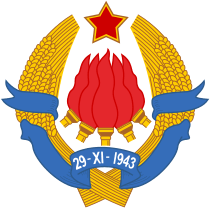State Anti-fascist Council for the National Liberation of Bosnia and Herzegovina
The State Anti-fascist Council for the National Liberation of Bosnia and Herzegovina (Serbo-Croatian Latin: Zemaljsko antifašističko vijeće narodnog oslobođenja Bosne i Hercegovine, ZAVNOBiH) was formed as the highest governing organ of the anti-fascist movement in Bosnia and Herzegovina and during World War II developed to be the bearer of Bosnian statehood. It was formed on 25 November 1943, under the administrative umbrella organization of the Yugoslav Partisans, AVNOJ and declared Bosnia and Herzegovina to be an equal community of Muslims (Bosniaks), Serbs, and Croats. Its president was Vojislav Kovačević.

History
ZAVNOBiH held three sessions: the first in Mrkonjić Grad on 25 November 1943 (now celebrated as National Day, but only within the Federation of Bosnia and Herzegovina entity, as Republika Srpska entity leaders deny the event's historical importance.[1]), second in Sanski Most, on 30 June 1944, the third, and last in Sarajevo, 26 April 1945. The first ZAVNOBiH session began at 7 p.m. and ended at 4 o'clock the morning. This inaugural meeting was attended by 247 delegates from all parts of Bosnia and Herzegovina, of which 173 had voting rights. ZAVNOBiH was formally constituted as a General Policy Representation of People's Liberation Movement of Bosnia and Herzegovina, but in reality and practice acted as its highest authority.
The delegates adopted a resolution ZAVNOBiH Proclamation and peoples of Bosnia and Herzegovina in the statement that the future of Bosnia and Herzegovina and its people at home and abroad, may represent the only ZAVNOBiH and AVNOJ. The documents at the same time expressed the determination of the people of Bosnia and Herzegovina that their country, which is neither Serbian nor Croatian, nor Muslim (Bosniak), but Serbian and Croatian and Muslim, is a brotherhood community in which they will be provided with full equality of all Serbs, Bosniaks and Croats. The session also elected a delegation of 58 members to represent Bosnia and Herzegovina at the Second Session of AVNOJ (29 November 1943). At the same time constituted the Presidency ZAVNOBiH, composed of 31 members, with Dr. Vojislav Kecmanović doctor from Bijeljina, as president.
Embodied in the People's Liberation Committees and ZAVNOBiH are:
- Equality between Serbs, Muslims and Croats of Bosnia and Herzegovina, which is their common and indivisible homeland;
- Freedom of religion and conscience and the equality of all religions;
- Freedom of assembly and agreement, association and the press;
- Personal and property security of citizens, as well as the freedom of private initiative in economic life;
- Equality between women and men, both in the political life of the country and in all spheres of social activity;
- Election law in a democratic Bosnia and Herzegovina, voters will be made by secret ballot on the basis of universal, equal and direct suffrage;
- Active and passive suffrage has every male and female citizen who are over 18 years of age, and are not deprived of this right under the law;
- The fighters of the National Liberation Army and Yugoslav partisan have this right irrespective of age;
- Every citizen is guaranteed the right to appeal the decision of the authorities, as well as the right to petition and complaints to all bodies of state power;
- No one may be sentenced without court proceedings.
See also
References
- "25 November, Statehood Day, Bosnia and Herzegovina". Department of Literature, Area Studies and European Languages. University of Oslo. 24 August 2010. Retrieved 24 November 2011.
| Wikimedia Commons has media related to ZAVNOBiH (State Anti-fascist Council for the National Liberation of Bosnia and Herzegovina). |
